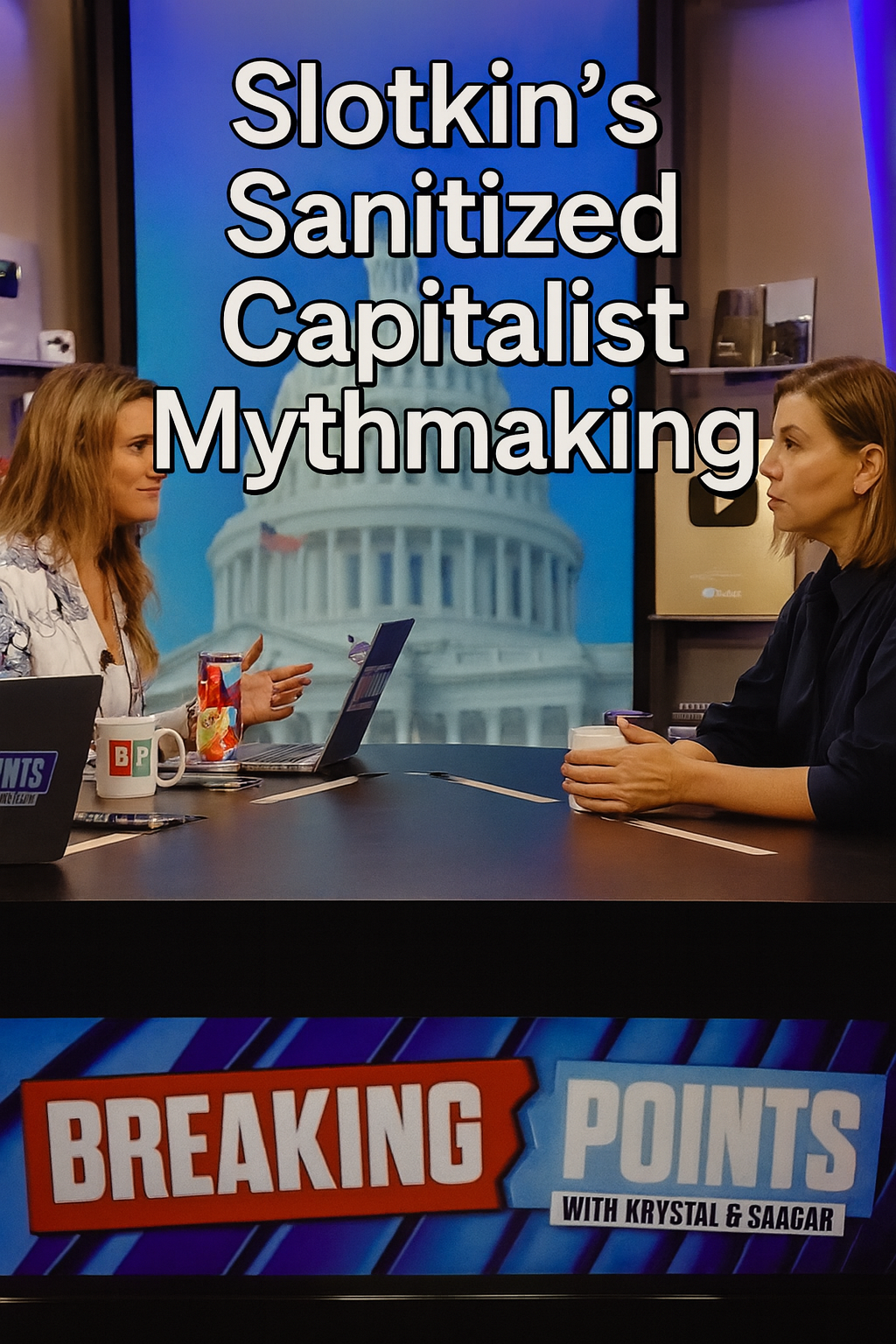
BTR News – Bootstraps, US Senator Slotkin’s Sanitized Capitalist Mythmaking
Podcast: Play in new window | Download (Duration: 25:18 — 35.0MB) | Embed
Subscribe: Amazon Music | iHeartRadio | Email | TuneIn | RSS | More
By Scotty T. Reid, Black Talk Radio News
On one of my favorite independent news podcasts, Breaking Points, a recent segment featured Michigan’s U.S. Senator Elissa Slotkin—Democrat by affiliation, establishment gatekeeper in practice—who leaned on her family’s business legacy to swipe at democratic socialism and the popular policies gaining traction within her party’s base.
Asked about the Democratic primary victory of New York mayoral nominee Zohran Mamdani, Slotkin deployed the familiar centrist sleight of hand—insulting NYC voters by feigning ignorance about how they vote, as if they were some foreign population. Never mind her background as a CIA Middle East analyst before running for office—apparently her analytical skills vanish when the topic is New York’s electorate. She briefly acknowledged voters’ frustrations, then quickly pivoted to a sentimental tale about her great-grandfather “lifting himself up” through capitalism.
Capitalism, she claimed, “gave him the opportunity” to build a business and pass down wealth through the generations—ending, of course, with her.
What she left out could fill volumes. This bootstraps story isn’t even hers—it belongs to her ancestor Samuel Slotkin, who immigrated to the United States in the early 1900s, when the borders were open wide to European whites. Even Jews fleeing pogroms in Tsarist Russia could arrive in America and, after clearing Ellis Island, enter the white working class with access to property, jobs, and legal protections. That’s not to diminish their struggles, but let’s be clear: Samuel Slotkin arrived in an era when the U.S. government was barring Asians, lynching Black Americans, and stealing Indigenous land.
Slotkin’s narrative asks us to believe capitalism rewarded “hard work” alone, not the social and political carve-outs for white immigrants. In truth, what was rewarded was his whiteness—and timing. Her great-grandfather built Hygrade Food Products in Detroit, a city booming with industrial growth, federal contracts, and an economy rigged in favor of white workers. Meanwhile, Black citizens were shut out of union jobs, confined to redlined neighborhoods, and denied wealth-building opportunities. This was capitalism—but not the free-market fairy tale she’s selling. It was a racialized, class-stratified system designed to lift a select few while exploiting the rest—in other words, a system of racist apartheid.
Even if we strip race out of the picture (a dangerous and dishonest exercise, but let’s entertain it), her story still fails as a defense of capitalism. Early 20th-century working-class whites often labored as children in sweatshops, faced violent strike-busting by police, and had virtually no legal protections. OSHA didn’t exist. “Opportunity” came at the cost of broken bodies and generations of toil. Families like hers succeeded because they started with just enough access, just enough protection, and a system designed to exploit labor while rewarding capital—and they had the capital.
Today, Slotkin sits atop that legacy while lecturing the rest of us about “free stuff.” But America already has socialism—it’s just socialism for the rich. Billionaires get tax breaks, banks and automakers get bailouts, defense contractors get no-bid contracts, the private prison industry thrives, and some corporations pay negative federal income tax. Working people, meanwhile, get means testing and sermons about “fiscal responsibility.”
Slotkin doesn’t just oppose policies that would give working people affordable housing, healthcare, local food access, and a living wage—she undermines them with a sanitized family story that erases history, class, and race. All to protect a Democratic establishment that caters to American oligarchs while tossing the working class crumbs like “no taxes on tips” under a certain amount.
If she wants to talk about bootstraps, let’s talk about who’s been holding the boots—and who’s been under them.
Slotkin’s Myth Doesn’t Match the Movement
So what does this selective storytelling achieve—and what does it erase?
First: A new generation is rejecting the whitewashed capitalism Slotkin defends. As of May–June 2025, polls show 62% of Americans aged 18–29 view socialism favorably, with nearly a third even expressing favorable views of communism. In cities like New York—where Zohran Mamdani just rattled the political class with his primary win—nearly half of voters say they’d support a socialist mayor. These aren’t fringe beliefs; they’re mainstream among younger voters and growing fast.
Second: While the broader electorate still leans toward capitalism, they don’t support the corporate-managed variety Slotkin represents. A recent Rasmussen/Heartland poll found that 71% of voters favor free markets, but half of voters under 30 would vote for a democratic socialist for president. That’s not contradiction—it’s clarity. Younger voters understand that real freedom requires economic stability, not billionaire subsidies.
Third: Slotkin’s hollow “hard work” rhetoric rings false because people know their own reality—wages that don’t keep up with inflation, healthcare that bankrupts, housing that’s unattainable—while politicians like her protect corporate donors and run cover for a system rigged from the top down.
Across the country, democratic socialists are winning not on abstract ideology but on concrete policies like rent control, tuition-free college, Medicare for All, and wealth taxes. These aren’t radical—they’re popular. What’s radical is defending a capitalist legacy that enriched a few while impoverishing the many, then weaponizing that legacy to attack a growing movement.
The Bottom Line
Slotkin’s family story reads as a paean to the virtues of capitalism—but only a narrow, exclusionary version, built on racial privilege, worker exploitation, union suppression, and exclusionary law. Her critique of democratic socialism conveniently ignores the fact that America already practices it—for the wealthy.
Young voters aren’t fooled. They know nostalgia for a sanitized capitalism won’t fix student debt, unaffordable housing, or stagnant wages. They want public investment, not moralistic lectures—and they’re rallying behind leaders who challenge establishment gatekeepers like Slotkin.
If Senator Slotkin wants to use her great-grandfather’s story to attack socialism, she’d better start telling the whole truth—because the next generation is telling theirs, and they’re not buying what she’s selling.